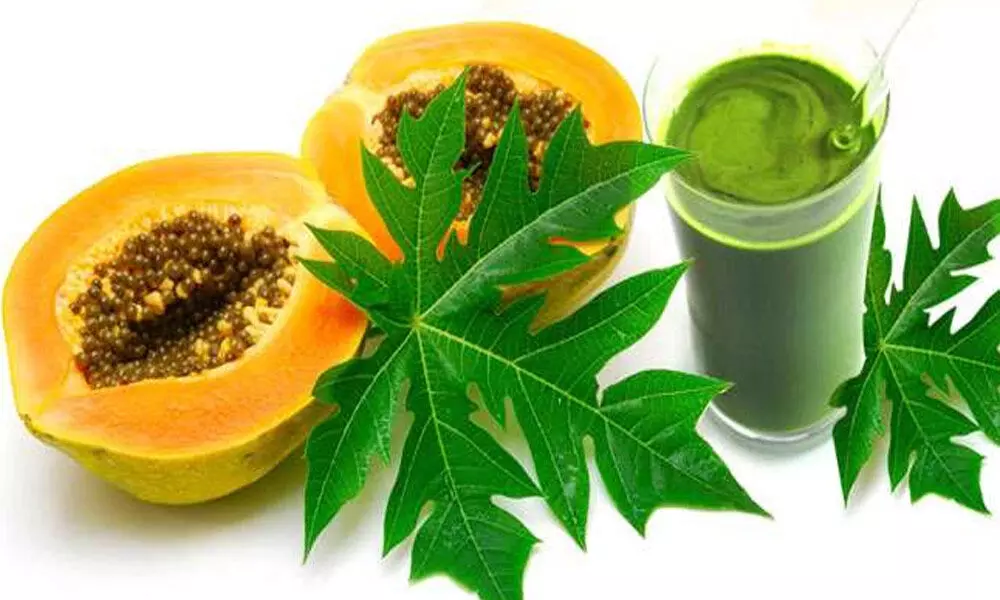Papaya leaf juice: Know its benefits & learn to prepare it

Papaya leaf juice
Papaya is common man’s fruit, it is also known as papita, its scientific name is Carica papaya.
Papaya is common man's fruit, it is also known as papita, its scientific name is Carica papaya. It is grown in tropical regions and it is one of the most loved fruits in India. The above fruit is a rich source of nutrients and great for health.
Why this fruit gained popularity in recent years?
In the recent few years, it has gained much popularity because it offers lot of health benefits. Every part of the papaya plant has antibacterial properties and also it has medicinal value.
Helps Increases the platelet count
Apart from the fruit, the most consumed part of the papaya tree is its juice made out of papaya leaves. The above juice helps increase the platelet count; it is the most popular Desi remedy.
Here is the list of several health benefits of Papaya leaf Juice
Can help treat Dengue Symptoms
Papaya leaf juice is commonly used to treat symptoms associated with Dengue fever. There exists no specific treatment for dengue as of now. A study was conducted on hundreds of people suffering from Dengue; when they were offered papaya leaf juice their blood platelet level increased tremendously.
Can help balance blood sugar level
The juice made of papaya leaf is served as a natural medicine to treat diabetic patients; they showed significant signs of improvement in their blood sugar levels. Studies were conducted on mice, they found that, the leaf extracts of papaya , was full of antioxidant and it produced blood sugar lowering effects. It also helps protect the insulin producing cells in pancreas from getting damaged leading to premature death.
Can Support Digestive Health
Tea prepared using papaya leaves help alleviate digestive symptoms such as heartburn, bloating and gas. Its leaves contain fiber, it supports digestive health, it helps break down the larger protein into smaller one, and thus it becomes easier to digest proteins as well as amino acids. It also helps treat numerous health problems such as constipation, heartburn and alleviate symptoms of those individuals suffering from irritable bowel syndrome.
These finding are restricted to anecdotal reports but there is no harming in trying this simple remedy.
Anti-inflammatory effects
The Papaya leaf juice also helps treat a range of both internal as well as external inflammatory conditions such as muscle aches as well as joint pain.
A study was conducted and its finding stated that, papaya leaf extract helped significantly reduce the both inflammation as well as swelling in rat paws with arthritis.
Can Promotes Hair Growth
Application of papaya leaf juice on the scalp promotes hair growth as well as hair health. But the proof of evidence is limited. The papaya juice contains antifungal properties, these help control dandruff causing fungus referred as Malassezia.
Can help achieve Healthy Skin
When papaya leaf is consumed orally or its juice is applied on the skin, it will help you clear as well as clean skin. It contains protein dissolving enzyme known as papain, which works as an excellent exfoliant and it successfully helps remove both dead skin cells as well as dust. It also helps reduce the appearance of clogged skin, acne and ingrown hair.
Contains anti-cancer properties
In traditional medicinal practices, the papaya leaf has been used, this helps both. prevent as well as treat specific types of cancer. The above juice has potential ability to inhibit growth of breast cancer cells as well as prostate in the test tube studies. No human as well as animal studies have replicated the above findings.
How to Prepare Papaya Leaf Juice?
Take some fresh papaya leaves, cut the stems. Start chopping the leaves as to how you chop cabbage and add some water to the chopped papaya leaves. The next step would be, put them in a blender and churn it for some time. The papaya juice is ready. You can take around 30ml to 35 ml of juice three times a day, to help reduce the symptoms of dengue fever. You can also add some sugar or bit of salt, so that it tastes better while you drink.















